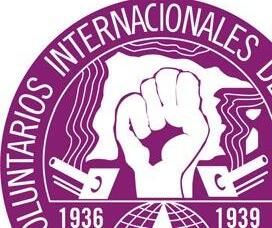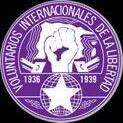

¡NO PASARÁN!
International Brigade Memorial Trust l 1-2025 l £5


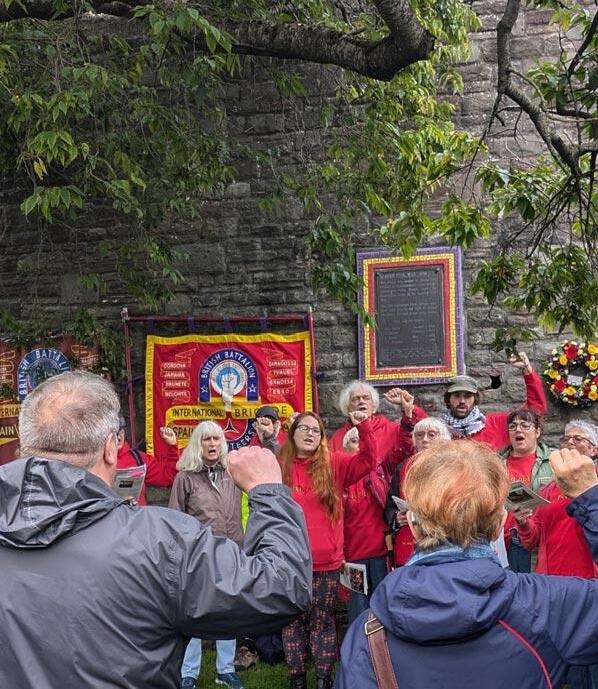

Solidarity in song
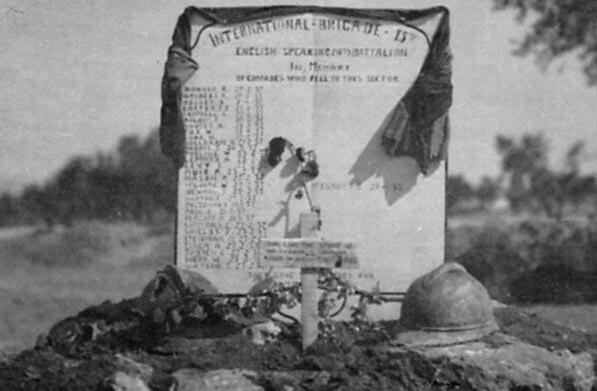

REMEMBER JARAMA
the Madrid-based Association of Friends of the International Brigades
Thursday 20 February
Madrid
l 7pm: ‘The Volunteers’, a play written by Charles Nusser of the Lincoln Battalion, Centro Cultural de la Mujer, 19 Cayetano Pando, Madrid 28047.
l Afterwards, reception at the AABI office, 3 Cayetano Pando, Local 4, Madrid 28047.
Friday 21 February
Option A
Madrigueras
Organised by AABI
l 9am: Departure Hotel Agumar, 7 Paseo de la Reina Cristina, Madrid 28014.
l Pass through Saelices to see the American Hospital (Villa Paz).
l Visit to the International Brigades memorial in Madrigueras.
l Lunch.
l Return through Tarancón to see the Hospitalillo
Option B
Tarancón
Organised by IBMT & ARMH Cuenca
l 10am: Departure Hotel Agumar, 7 Paseo de la Reina Cristina, Madrid 28014.
l Tribute at Tarancón cemetery to honour Scottish volunteers.
l Visit to an air-raid shelter in Santa Cruz de la Zarza.
l 3pm: Lunch.
l 5.30pm: Return to Hotel Agumar.
NB: Please write to ARMH Cuenca at taranconfebruary@gmail.comtoregister fortheTarancóntrip.
Saturday 22 February
Jarama March
l 8.45am: Departure Hotel Agumar.
l This year’s route follows the Lincoln Battalion’s steps and the positions of the XVth Brigade.
l Visit to the identified place of the American memorial.
l 1.30pm: Lunch.
l 3.30pm: Return to Madrid.
Sunday 23 February
Madrid
l 11am: Meet at the exit of the Montecarmelo metro station for a visit to the Fuencarral cemetery.
l Homage at the International Brigade plaque and a tour of the possible mass grave site.
If you plan to attend all or any of these events and want to make contact with other IBMT members or have any queries, email IBMT Scotland Secretary Mike Arnott: scotland@international-brigades.org.uk

INTERNATIONAL BRIGADE MEMORIAL TRUST
IBMT, 37a Clerkenwell Green, London EC1R 0DU l 07865 272 639 admin@international-brigades.org.uk l www.international-brigades.org.uk
¡NO PASARÁN!
Magazine of the International Brigade Memorial Trust
No.68 l 1-2025

6 New Year message
t Bristol’s Red Notes Choir singing songs from the Spanish Civil War in Castle Park, beneath the city’s memorial to the four Bristolians who died in Spain.
l IBMT President Marlene Sidaway looks forward to the Trust’s activities in 2025.
7 Alec Marcowich
l David Grants casts modern eyes on a Brigader once viewed in a dim light.
10 Spain today
l Juan López Páez reports how right-wing parties in Spain are whitewashing Franco’s legacy.
12 Remembrance
l Piers Secunda explains how he uses his artwork to support exhumations of Franco’s victims.
14 George Wheeler
l Richard Baxell remembers a Battersea volunteer.
16 Hull
l A look back at two recent events in the city.
18 Salford
l Robert Hargreaves on the campaign for a new memorial in the North West.
19 Books
l Reviews of ‘Spanish Sky Spreads Its Stars’ and ‘Churchill’s Spaniards’.
22 A tale of two Croydons
l Jim Jump reflects on the town’s complicated history with the Spanish Civil War.
¡NoPasarán!(formerly the IBMTMagazineand the IBMTNewsletter) is published three times a year. Back numbers can be downloaded from the IBMT website. All content is the © of the IBMT and credited contributors and cannot be reproduced without written permission. Views expressed are not necessarily those of the IBMT.
Editor Helen Oclee-Brown 07865 272 639
admin@international-brigades.org.uk
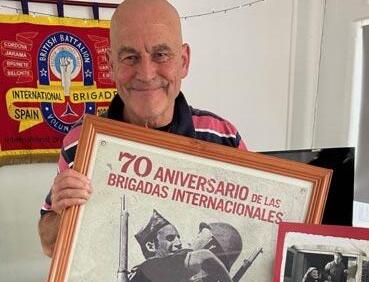
Dave Chapple holds a poster that volunteer Andy Andrews (1907-2008) brought back from a 70th anniversary trip to Spain. Andrews is pictured (bottom right) on the cover of a book written by Chapple about his life.
Members hail West Country Brigaders
The IBMT held its Annual General Meeting in The Stable, Weston-super-Mare, on 5 October as a part of a weekend of commemorative, educational and social activities. Attendees came from across the UK and Ireland to remember the local volunteers. IBMT Archivist Alan Lloyd spoke about the West Country Brigaders. Dave Chapple, Secretary of Bridgewater Trades Union Council, focused on one in particular: Andy Andrews
Members were treated to musical and dramatic performances organised by (and starring) local IBMT member Malcolm Cuthbertson (see page 4) on Friday and Saturday evening before the weekend's events came to an end with a commemoration on
q Nicola Garbett, daughter of Manchester Brigader Bernard McKenna, and son, Scott Paynter, at the AGM.
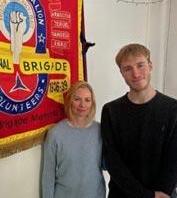
Sunday in Bristol's Castle Park, where the Red Notes Choir sang songs from the Spanish Civil War below the memorial to four Bristolians killed in Spain.
AABI, the Madrid-based Association of Friends of the International Brigades, was among several groups and individuals to send messages of solidarity. Below is what AABI President Almudena Cros said:
We[AABI]sendyouourfraternalgreetingsfrom Spain. During uncertain times, and facing the threat of fascism, thousands of workers from the United Kingdom made a choice. They travelled to Spain and fought tooth and nail against international Fascism. Barely 90 years later, we are in similar circumstances with the increased cost of living, the real threat of a world war, and the polarised political climate everywhere. Both IBMT and AABI share a mission to remember our brave working-class heroes and heroines and pay tribute to them. Thank you, IBMT members, for your continued support of our shared cause.
Trustee elections
Three members of the IBMT’s Executive Committee (EC) were re-elected for another three - year term at the Annual General Meeting in October. They are Alan Lloyd from Southampton, Dolores Long from Manchester and Luke O’Riordan from Dublin, who will job-share with newly elected Lynda Walker from Belfast.
It was noted that there is a regional gap in representation on the committee from Yorkshire and the North East; the EC has the authority to co-opt a new trustee to fill this gap.
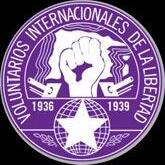
The International Brigade Memorial Trust keeps alive the memory and spirit of the men and women who volunteered to fight fascism and defend democracy in Spain from 1936 to 1939
International Brigade Memorial Trust
37a Clerkenwell Green, London EC1R 0DU Executive Officer Helen Oclee-Brown 07865 272 639
admin@international-brigades.org.uk www.international-brigades.org.uk
Registered charity no.1094928
President Marlene Sidaway
president@international-brigades.org.uk
Chair Jim Jump chair@international-brigades.org.uk
Secretary Megan Dobney secretary@international-brigades.org.uk
Treasurer Paul Coles treasurer@international-brigades.org.uk
Scotland Secretary Mike Arnott scotland@international-brigades.org.uk
Wales Secretary David McKnight wales@international-brigades.org.uk
Other Executive Committee members
David Chanter, Alex Gordon, John Haywood, Jonathan Havard, Alan Lloyd, Dolores Long, Luke O’Riordan, Lynda Walker
Founding Chair Professor Sir Paul Preston
Patrons Professor Peter Crome, Professor Helen Graham, Ken Livingstone, Len McCluskey, Christy Moore, Jack O’Connor, Maxine Peake, Baroness Royall of Blaisdon, Mick Whelan
Historical Consultant Richard Baxell
NEWS
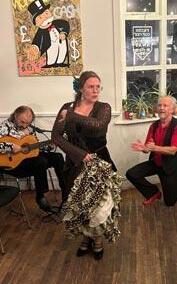
FROM PREVIOUS PAGE
The Trust’s financial report and report of activities for the last 12 months were approved by the meeting.
IBMT members in Belfast have offered to host the next AGM in Belfast on 3-5 October 2025. The invitation was warmly accepted.
The full minutes of the meeting are available on the IBMT website, as are photos of the entire weekend’s events.
Historians discuss Britain’s role
The IBMT’s 2024 Len Crome Memorial Conversation returned to its in-person format at a well-attended Marx Memorial Library on 9 November. The topic was the differing British responses to the struggle of the Spanish Republic, from public support to governmental obstruction.
Chaired by Richard Baxell, the discussion between Helen Graham and Paul Preston was a lively and entertaining dissection of politics in 1930s Britain.
The annual conference is named after Len Crome, born Lazar Krom in 1909 in Latvia, who was a GP in Blackburn in 1936 when he volunteered to go to Spain. He rose to the rank of major and headed the medical services of the 15th and 11th Brigades.
Peter Carroll (1943-2024)
The IBMT was saddened to learn of the death on 16 September of Peter Carroll, historian of the American volunteers in the Spanish Civil War and a leading figure in ALBA, our sister organisation in the US. Peter served as the chair of ALBA for many years and was particularly involved in editing The Volunteer magazine and in educational work with teachers and schools.
He delivered the IBMT’s annual Len Crome Memorial Lecture at the Imperial War Museum in London in 2012, ‘From Guernica to Human Rights: The Spanish Civil War in the 21st Century’.
Among the many books Peter authored was ‘The Odyssey of the Abraham Lincoln Brigade: Americans in the Spanish Civil War’. Published in 1994, it is regarded as the finest history of the American International Brigaders.
Newham memorial unveiling
Clapton Community Football Club (CCFC), which since 2018 has worn the colours of the Spanish Republic on its away shirts, has announced that a new memorial to the International Brigades will be unveiled on 26 April 2025, just before the last CCFC men’s first team league game of the season.
The stone memorial (pictured below uninscribed) is dedicated to the 20 volunteers from what is now the London Borough of Newham. It will feature a poem by Brigader David Marshall, who was wounded near Madrid and
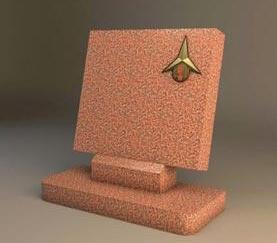
t The new Newham memorial, which will be unveiled at the Old Spotted Dog Ground, home to Clapton Community Football Club, in spring 2025.
Dancers Wenda Coleman and Malcolm Cuthbertson with guitarist Dave Nash performing at the AGM weekend.
repatriated in 1937. David was the late partner of IBMT President Marlene Sidaway, who will be attending the unveiling.
Glasgow honours local volunteers
The annual Glasgow commemoration, organised by Hope not Hate Glasgow, was held on 21 September. A large gathering heard speeches by Mike Arnott (IBMT Scotland Secretary), África Moreno (PCE Exterior), Nathan Hennebry (GMB Scotland Youth Committee), Jennifer McCarey (Glasgow TUC) and Tommy Campbell (Aberdeen XV International Brigade Commemoration Committee).
Mike Arnott used his speech to talk about the newly rediscovered Soldiers Tree memorial at Carbeth (see issue 67) and to mark the death in August of Glaswegian Allan Craig Jr, whose work to commemorate his father, Dundee-born Brigader Allan Craig, had initiated the annual ceremony at Tarancón in Spain (see page 3 for details of this year’s trip).
Talk on nurse Ruth Ormsby
Belfast’s International Brigade Commemoration Committee held its annual event as part of the 2024 Féile an Phobail (People’s Festival). The topic was the medics who provided vital support for those who were injured and dying in the anti-fascist war in Spain from 1936 to 1939, focusing specifically on Sligo-born nurse Ruth Ormsby, who ultimately died in Spain.
Filmmaker Johnny Gogan and documentarymaker and Civil War tour guide Catherine Howley spoke at the event on 9 August, held in the Shankill Road Library, where there is a plaque to the seven local men who died in Spain. Interspersed with clips from Howley’s documentary, their talks charted Ormsby’s life from Sligo to training in Glasgow and then to Spain in 1937 as part of the International Brigades’ medical aid effort.
David Rolston, a great nephew of Ormsby, made a welcome contribution to the discussion, as did Liz Shaw, daughter of Joe Boyd, a medic from Belfast.
North Lanarkshire remembers
The No Pasarán Memorial Committee of North Lanarkshire held its annual memorial on 28 July in the Duchess of Hamilton Park Motherwell. A large crowd attended the event.
Andy Jones of the committee explained that the memorial was primarily erected to remember the 11 brave individuals who left North Lanarkshire as part of the International Brigades to fight fascism in the Spanish Civil War, some giving their lives in the ultimate sacrifice.
The main speaker was IBMT Scotland Secretary Mike Arnott, with music by Paul Sheridan. There was also a reading of the poem 'Graves of Spain' and from the roll of honour. The service ended with a minute's silence and the laying of wreaths.
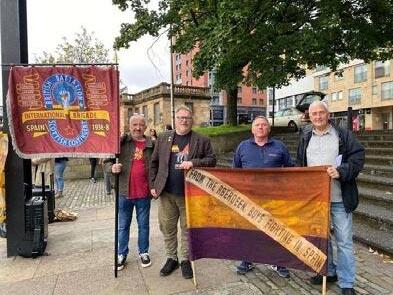
Family headstone restored IBMT supporters in the Blyth area raised funds to restore the Elliott family headstone (pictured right) in St Peter's Churchyard, West Sleekburn, Northumberland.
Robert ‘Bob’ Elliott was a National Unemployed Workers' Movement activist and Hunger March leader.
He was a Communist Party councillor in Blyth during the 1930s and was killed while serving with the British Battalion of the International Brigade at Brunete.
After his death, his name and service were added to his family headstone. However, it had fallen into decay over the years. The headstone has now been restored to a fine condition.
In Blyth itself, the sheltered housing facility Bob Elliott House is named after him and he is commemorated by a blue plaque on the building
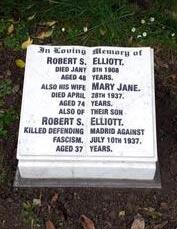
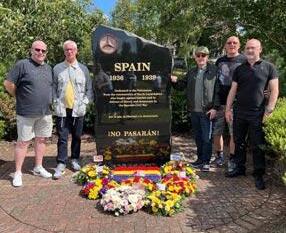
p Supporters at the Glasgow commemoration at La Pasionaria statue in Custom House Quay.
t Supporters at the annual commemoration in Duchess of Hamilton Park, Motherwell.

Your local IBMT affiliated memorial group
The IBMT supports the work of affiliated local International Brigade memorial groups. Annual IBMT affiliation costs £40. You can affiliate through our website: www.internationalbrigades.org.uk/membership.
DIRECTORY
l Aberdeen XV International Brigade Commemoration Committee
Contact: Tommy Campbell tommy.campbell@outlook.com
l Belfast International Brigade Commemoration Committee
Contact: Ernest and Lynda Walker lyndaernest@btinternet.com
l IB Cymru
Contact: Mary Greening ibcymru@gmail.com facebook.com/groups/314892162181123
l Hull International Brigades Memorial Group
Contact: Gary Hammond thehutpeople@gmail.com
l North East Volunteers for Liberty
Contact: Tony Fox NEVolunteersforliberty@gmail.com
l North West International Brigade Memorial Group
Contact: Dolores Long doloreslong@fastmail.fm twitter.com/ibgtrmanchester
l Oxford International Brigade Memorial Committee
Contact: Colin Carritt colin.carritt@tiscali.co.uk
l Sussex Brigaders Remembered
Contact: Pauline Fraser pbf262@myphone.coop
International Brigade Memorial Trust
www.international-brigades.org.uk
NEW YEAR MESSAGE
Looking to the future
We have plenty to look forward to in 2025, with the autumn looking especially busy.
In October, we’ll be in Belfast for the Trust’s Annual General Meeting (AGM) after 18 years away. I’d like to thank local members, particularly Lynda and Ernest Walker, of the IBMT-affiliated International Brigade Commemoration Committee, for their enthusiastic proposal – we know a warm reception awaits us!
Following the AGM, we hope to welcome back three leading historians of the Spanish Civil War – Helen Graham, Paul Preston and Richard Baxell – for what I’m sure will be another fascinating Len Crome Memorial Conversation.
‘We know how fragile democracy can be. We owe it to the volunteers keep sharing their fight for democracy and against fascism.’
Then November marks the 50th anniversary of Franco’s death, and we’ll be celebrating 50 years of democracy in Spain.
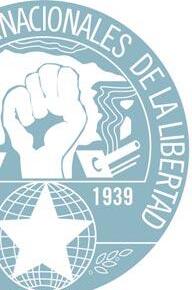
Thanks to your ongoing support, the Trust’s financial position is now improving and we can carry on our much-needed work.
As approved at the AGM, to continue our efforts (and to cover the increasing costs that we
all face), membership subs will go up modestly this year: the individual rate from £25 a year to £27.50; the concessionary rate from £20 to £22.
Concessionary membership is open to anyone who receives long-term unemployment or sickness benefit, who qualifies for income or pension credits or who is on the minimum wage.
Another change means scrapping the household category. This category was originally designed to avoid sending multiple copies of the magazine to the same address; however, it is no longer needed because the magazine is now sent out digitally or by subscription.
Note that these changes won’t come into effect until April, so you are welcome to renew at the current rates until then.
We know how fragile democracy can be. On page 10, you’ll read Juan López Páez’s report on how right-wing parties in Spain are manipulating Franco’s memory for their own ends. We owe it to the volunteers to keep their memory and spirit alive and to continue to share their fight for democracy and against fascism.
With your backing, our financial stability will translate into long-term health so that we can go on telling the stories of the International Brigades to future generations. Thank you so much for supporting us, Please, please continue to do so.
My very best wishes,

IBMT
President Marlene Sidaway
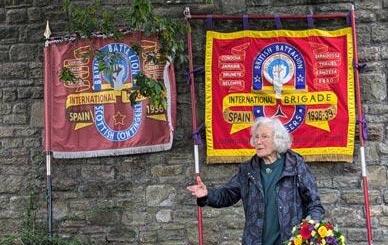
Marlene Sidaway speaking at the Castle Park memorial in Bristol as part of the 2024 AGM weekend of events.
u Scottish Jewish Brigader Alec Marcowich.
DAVID GRANT, of the University of Leeds, who is
researching British Jewish volunteers,
looks at one Brigader through modern eyes and considers whether he was fairly treated.
Alexander (Alec) Marcowich, born 1914, was brought up in the harsh district of the Gorbals in Glasgow by Jewish parents. He was politically active from the age of 15, joining the Young Communist League (YCL) in 1929.
Identified as a rising star on the left, he became a familiar figure on the streets of Glasgow and was known for his fiery speeches, often attracting crowds of 400 to 500 people. By 1933 he had joined the Communist Party, believing it was in his own words ‘the only party worth joining’ and that antisemitism, which was on the rise in Europe, ‘was a crime in the Soviet Union’.
Along with others from the Jewish community, he worked in the garment trade, eventually becoming a tailor’s cutter, a highly skilled role in the industry. His trade union work in the Tailors and Garment Workers Union elevated him to the national executive by his 21st birthday, and he addressed both the British and Scottish trade union conferences.
Yet this firebrand of the labour movement would, upon his return from volunteering for Spain, find himself ostracised from his former comrades leaving him with feelings of recrimination and bitterness. How did such a turn of events come about?
A committed and disciplined Communist, Marcowich absorbed himself in party literature and was deeply influenced by the
International Brigade
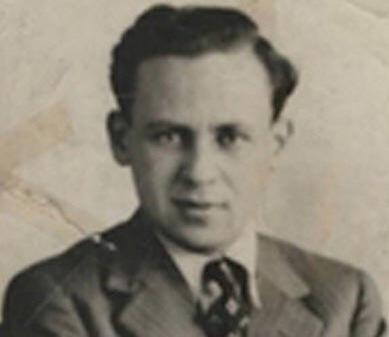
Rehabilitating a thenBrigader, and now
history of struggle in Glasgow and on the Clyde. In August 1937 he had volunteered for Spain, arguing that the party was initially not in favour of him going, probably because of his
‘When they reached London Victoria Station they were met by the police. Only Alec was asked to accompany them to Scotland Yard.’
value to the labour movement, although he held no formal position in it.
He left for Spain in a group of 12 following the usual route from London to Paris and then crossing the Pyrenees.
At an open meeting of the British Battalion at Madrigueras, Alec conceded that he was naïve in speaking out about the men’s grievances and believed he subsequently paid a high price in so doing.
The controversy originated around the issue of repatriation and compassionate leave that had some substance, given that volunteers had been assured they only needed to serve six months. More seriously, allegations were levelled at the British CONTINUED OVERLEAF
ALEC MARCOWICH
Battalion headquarters that they were abusing their position regarding food and provisions, accusations that remain unproven.
As a result of this very public admonishment of the battalion’s leadership, Sam Wild and Bob Cooney sent Marcowich up to the Brigade for ‘rehabilitation’.
His perceived ‘lack of discipline’ was probably compounded by the fact he had been appointed by Wild as an Assistant Commissar, a role he had accepted with reluctance. He also acknowledged that he had been guilty on one occasion of falling asleep while on duty. When he arrived at Brigade HQ they were at a loss why he was there!
Alec was assigned duties with a ‘corrective battalion’ of 30 men, all volunteers from several different countries. According to Marcowich, they were ‘all men of integrity and
‘Alec conceded that he was naïve in speaking out about the men’s grievances and then believed he paid a high price in so doing.’
had a background in the revolutionary movement, there was not a single deserter among them’. He contended throughout his life that he had no idea what the charges were levelled against him.
Ebro
While in the corrective battalion, he served at the Ebro before the main offensive and made eight to 10 forays over two months behind fascist lines with the task of capturing a prisoner. Half the men in his group were killed.
Following this experience, he was allowed to return to the British Battalion at Teruel as a machine gunner, although he noticed that the men kept their distance and were afraid to speak to him. After a few days, for reasons unknown to him, he was sent again to Brigade HQ where he was kept in a field along with socalled ‘criminals and those regarded as politically suspect’.
The war by this time had turned decisively against the Republic. After escaping from the field where he was being held, he was picked up by Spanish security personnel and sent to Castelldefels, a few miles south of Barcelona, where he was allowed to move around with relative freedom, although technically still under guard.
He considered trying to locate the British Battalion and rejoin it, although the logistics and chances of success of finding it were both complicated and improbable.
q Interned fighters at a camp in Argelès-sur-Mer (France) washing their clothes in the sea.

In January 1939, shortly before the fall of Barcelona, Marcowich discovered that the guards at Castelldefells Castle (the Brigades’ prison camp) had simply disappeared.
Aware that approximately 200 kilometres of territory remained open between him and the French border before it was closed off by the advance of Franco’s armies, he decided to join the throng of refugees making their way north.
By this time the International Brigades had already been officially withdrawn from Spain. Along the way he met Hungarian, German and Romanian volunteers who were conscious of the fact they had no home to return to.
After crossing into France, Marcowi ch found himself held in the internment camp at Argelès-sur-Mer, guarded by Senegalese troops and situated adjacent to the sea, literally on the beach. Conditions were appalling and insanitary, with no protection from the elements.
He recalled how the nighttime brought its own terrors as ‘revenge attacks’ were common with many suspected fascists being murdered and their bodies horribly mutilated.
Alec’s salvation from these horrors was due to the intervention of a British Consul official who secured his release, along with eight others and provided them with some wine, a bar of chocolate and a ticket home. Although this representative of His Majesty’s Government could not resist berating the
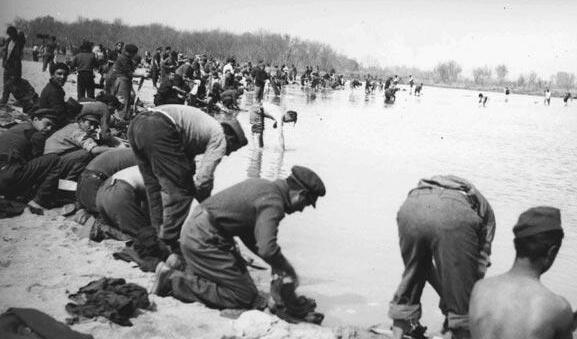
u Bob Cooney (foreground) and Sam Wild (right) in Spain during the Battle of the Ebro in 1938. They sent Marcowich for ‘rehabilitation’.
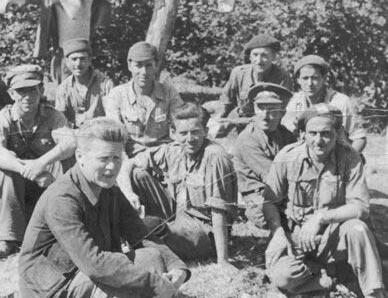

volunteers for ‘causing so much trouble’.
The journey home involved an open truck, a train and a ferry to the port of Newhaven. When he and his travelling companions reached London Victoria Station they were met by the police. Only Alec was asked to accompany them to Scotland Yard, the others being allowed to continue their journey.
Shortly released by the police, who appeared neither satisfied nor dissatisfied with the interview, Marcowich made his way the short distance to King Street, the headquarters of the Communist Party, to speak to Harry Pollitt.
The General Secretary appeared indifferent to Alec’s complaints regarding his treatment in Spain, although JR Campbell, the editor of the Daily Worke r, gave him a single ticket to Glasgow, a chit for a suit and £1 for expenses.
Pollitt no doubt would have exercised caution when confronted by Marcowich and kept his views to himself before trying to establish the facts, if indeed he was so inclined. Marcowich also crossed paths at King Street with former senior Brigade Commissar, Peter Kerrigan and the Daily Worker war correspondent since May 1938, but decided not to get involved in a discussion with him.
Marcowich had sent a postcard to his parents from Paris and upon arrival in Glasgow was met by his father. The family had believed that he had been killed in Spain and accordingly had sat the Jewish ritual of shiva for seven days. All the members of his family came to see him; it was as if he had been
resurrected from the dead.
Back in Glasgow, Marcowich noted that although he was not expelled from the Communist Party and it was unclear if there were grounds for such a decision, Party members appeared to be wary of him and standoffish.
When the Second World War broke out Marcowich presented himself as a consciousness objector, but his case was rejected. He was required to go before a tribunal and a medical board, his line of defence being that he was concussed in Spain and experienced temporary blindness. Again, his pleas were turned down, although it was a split decision that went against him.
He was formally called up after the invasion of the Soviet Union in June 1941, reporting to the Royal Army Service Corp in Matlock after 12 weeks’ training. Maintaining that the army knew he was a communist, he saw out the war in the Service Corp offices and was never sent overseas.
Alec Marcowich drifted away from politics
‘Decades later, it is hoped that this article suggests that, in times of war, not every decision is the right one no matter how just the cause.’
over the following years and became increasingly critical of the Soviet Union, particularly following what he saw as the antisemitic character of the ‘Doctor’s Plot’ in the late 1940s and early 1950s.
He maintained that it was only his tendency to speak out on behalf of other volunteers that brought him into disrepute with the leadership.
Interview
Arguing in later life in an extensive recorded interview that he understood the army needed discipline and a strict command structure, he in no way saw himself as labelled in a report filed in the Moscow archives, as being ‘Very bad. A disrupter. Trotskyist. Dangerous’.
The IBMT database records in a welcomed updated entry note that ‘he was always aggrieved at his treatment, having never been formally charged with any offence’.
We will never know the motives of the military leadership for removing Alec Marcowich from the British Battalion and sending him for ‘rehabilitation’, but we can only speculate that it was believed he was undermining morale at a critical time during the civil war.
A subjective view is that it was not unusual at a time of increased paranoia regarding anyone who demonstrated dissent.
Decades later it is hoped this article redresses some of the injustices this volunteer endured while defending the Spanish Republic and suggests that, in times of war, not every decision is the right one no matter how just the cause.
Marx Memorial Library

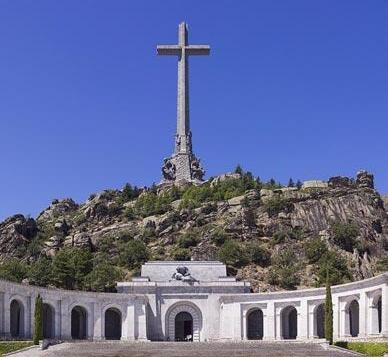
The right-wing counteroffensive against the truth
UK-based Spanish Communist Party (PCE) member JUAN LÓPEZ PÁEZ describes the way the Spanish right is whitewashing Francoism and suggests ways to fight this revisionism.
The Spanish right still sees Francoism as a touchstone they refuse to question. It’s not just about nostalgia – they understand how the past shapes both the present and the future. Their insistence on hiding the truth about the past and their attempts to ensure that their false narrative becomes socially dominant are understood as
efforts to legitimise their projects.
The electoral results of the regional elections in May 2023 allowed the formation of several regional governments through alliances between the right-wing Popular Party (PP) and far-right party Vox in Cantabria, Aragón, the Balearic Islands, Valencia, and Castile and León, where they have introduced several
t The cross at the Valley of Cuelgamuros, the Francoist monument near Madrid, where an estimated 33,000 Spanish Republicans and victims of the dictatorship are interred.
legislative initiatives. Vox’s involvement provides an excuse and justification for the PP to implement regressive policies, and the PP has generally acted as an extreme-right force on issues of historical memory wherever they have governed. There is also another consequence: the hollowing out of budgets, as has happened in Andalusia since the PP came to power
Right-wing administrations in the autonomous communities are implementing protective measures, when they can within the limits of their powers, to preserve Francoist monuments and symbols. This includes the Community of Madrid’s preservation of the cross at Cuelgamuros and the Junta of Castile and León’s plan to catalogue around 40 Francoist shields on building facades as cultural interest assets.
The shortcomings of the previous 2007 Historical Memory Law regarding Francoist symbols meant that public institutions removed the Francoist symbols and street names only where there was a political will to do so. The lack of clear definitions meant there were no deadlines or sanctions for non-compliance.
Democracy
In Spain, after more than 40 years of democracy, no specific policies have been implemented to dismantle the falsification of the history of Franco’s dictatorship. Impunity for the criminals has been maintained, as well as for those who deny the responsibility for Francoism (akin to Holocaust deniers).
This is the logical consequence of the Francoist impunity model certified during the transition to democracy. As the Supreme Court has stated in numerous rulings, the transition
‘After more than 40 years of democracy, no specific policies have been implemented to dismantle the falsification of the history of Franco’s dictatorship.’
was ‘from law to law’. In other words, it recognised the Francoist legality born from the 1936 coup, with no democratic break with the Francoist dictatorship, no purging of the Francoist state apparatus and no questioning of the privileges of the Francoist elites. This constituted one of the fundamental pillars on which the 1978 regime was built: the impunity of Francoist crimes and collective amnesia regarding the democratic experience of the Second Spanish Republic, the coup of 18 July 1936, the Francoist dictatorship and repression, and the anti-fascist struggles as state policy.
What can be expected from a state like Spain where not a single Francoist criminal has been tried and convicted for crimes against humanity committed during the Spanish Civil War or the dictatorship, where one can be considered a democrat without being anti-fascist? The Francoists not only won the Spanish Civil War but also won the transition to democracy.
Political will
Is there political will and real capacity to ensure that all institutions comply with the Democratic Memory Law (LMD)? We are talking about the Ministry of Defence, municipalities, autonomous communities and government delegations. There is a degree of ‘turning a blind eye’, if not complacency, when acts of glorification of the Francoist dictatorship and Nazism go unchallenged –showing contempt for the victims.
The right wing’s consistent idea is that if they get to the national government, their explicit purpose is to repeal the current LMD and replace it with a so-called ‘Law of Concord’. To
‘What can be expected from Spain where not a single Francoist criminal has been tried and convicted for crimes against humanity committed during the Spanish Civil War or the dictatorship?’
fight this, there must be irreversible changes, such as the removal of Francoist street names and symbols, and the declaration and monumentalisation of memory sites.
Future ‘concord laws’ would constitute a flagrant violation of the fundamental rights of Francoism’s victims and would be contrary to the current LDM. The national government should challenge them as they would be unconstitutional.
LMD regulations should be restrictive in their interpretation – for example, regarding the symbols and names to be removed by regional and local authorities – and decisive in defining the application of the sanctioning regime included in the law – such as in cases of glorification of Francoism and contempt for its victims.
What are the viable ways to oppose the right-wing tide in this matter?
l Exert social pressure wherever we can, channelling our proposals through democratic political forces, and linking our struggle with other groups and organisations targeted by fascism.
l Demand compliance with international human rights legislation, as well as the recommendations of UN rapporteurs and international experts.
l Amend Organic Law 10/1995, of 23 November, of the Penal Code, incorporating the principle of international legality into our domestic law (found in, among others, Article 7.2 of the European Convention on Human Rights and Article 15.2 of the International Covenant on Civil and Political Rights).
l Amend the Law on Political Parties, Associations, and Foundations to ban political organisations, foundations, associations or any other groups that do not condemn the 1936 coup, the Francoist dictatorship and the crimes of Francoism.
l Amend Article 578 of the Penal Code to include the legal recognition of the victims of Francoism.
l Develop and enforce the LDM to take precedence over regional laws, which should be the main weapon against negationist and regressive policies.
l Garner international solidarity, seeking support from supranational democratic institutions and international human rights organisations beyond formal declarations. Fascism is not an ideology, it is a crime. Let’s not take a step back against the historical denialism and whitewashing of Francoism promoted by the Popular Party and Vox.

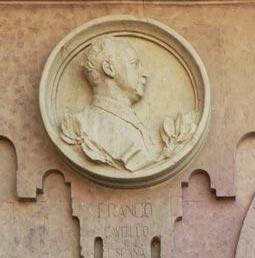
t This portrait of Franco, which once looked down on Salamanca’s Plaza Mayor, was removed in 2017; however, other symbols of the regime remain.
qAn existing Francoist shield on the headquarters of the Salamanca postal service, which the local authorities wish to preserve as a cultural asset.

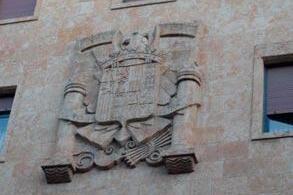
REMEMBRANCE

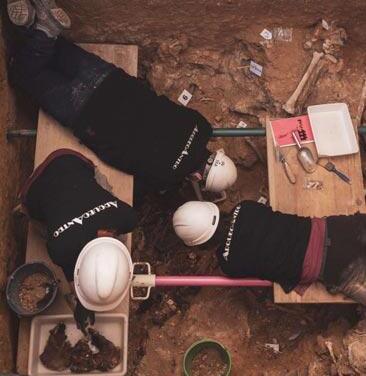

t Members of ArqueoAntro excavating a mass grave. ArqueoAntro, one of the beneficiaries of ‘No Me Olvides Por España’, is a multidisciplinary team of archeologists, anthropologists, restorers, curators, medical examiners, historians and documentary makers whose work includes locating, excavating, exhuming and studying the mass graves of the victims of the Spanish Civil War and the Franco dictatorship.
u Mapas de Memoria with a team from the University of Oxford and Cranfield University having found the bodies of eight people who were murdered in 1939 in Almadén (Ciudad Real, CastileLa Mancha). Mapas de Memoria is the other beneficiary of the ‘No Me Olvides Por España’ project.
x The ‘No Me Olvides Por España’ pin, designed by Piers Secunda. The pin is approximately 4cm long and 1.5cm across.

Forget-me-not pins
PIERS SECUNDA shares the motivation behind his artworks and how one project, ‘No Me Olvides Por España’, supports exhumations in Spain.
For almost 25 years I have been making works of art about geopolitics. In 2001, I was living outside New York City and watched the Taliban destroy the Bamiyan Buddhas on television, then six months later 9/11 happened. It became impossible to continue making abstract art while these events were occurring: the overwhelming nature of 9/11 forced me to recognise that there had been a sea change in global politics.
Very quickly, I decided that I needed to make art about it, to work through the shock of what had happened and to get to grips with the surreal and overwhelming nature of the events.
Culture
Over the following 24 years, my work examining damage to culture had resulted in journeys to Afghanistan to try to understand the Taliban. It then took me to Iraq to get to grips with why ISIS was deleting history, to
ArqueoAntro

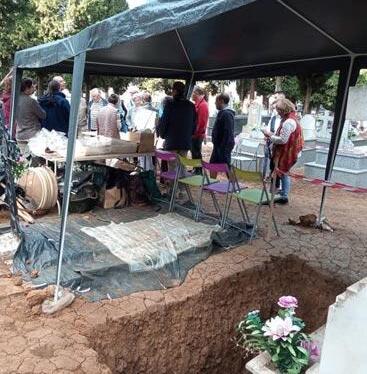
for Spain
speak to local people, to decipher what was happening and to make art about it. At every step, despite focusing on objects of art and ancient history, the human stories held my attention in equal measure. I started to seek out charities I could help with the sales from my work. Kind Aid International is one example: it is a UK-based charity that gives children orphaned by ISIS in the Nineveh Plain (Iraq) a home, an education, food and, in time, vocational training.
‘It became impossible to continue making abstract art while these events were occurring.’
I’m a strong advocate for direct funding and the charities I support provide this.
In 2022, I was introduced to a Spanish forensic anthropologist, Nicholas Márquez-Grant. The first time we spoke on the phone, Nicholas was waist-deep in an archaeological trench in southern Spain, working on exhuming remains from a mass grave of ‘disappeared’ victims of the Franco regime. The victims were Republican soldiers and people who simply dared to be in political opposition to Franco. The purpose of Nicholas’s excavations was to reunite the families with the remains of their long-lost relations.
During Franco’s rule, there was a brutal and common practice of executing and then burying political opponents in unmarked mass graves. An estimated 30,000 people remain in such graves across Spain. The process of identifying their remains involves local families providing DNA swabs. The human remains are then DNA-
tested. When there is a match, the families are presented with the remains at a formal and often very emotional ceremony. This means that they can bury their loved ones with a grave marker and finally have closure after many decades.
Nicholas asked me if we could work together to develop a memorial pin that could be worn as a symbol, rather like the Remembrance Day poppy. The pin serves to unite the families and the supporters of the tens of thousands of people who lost family and friends during the Spanish Civil War and throughout the Franco years.
Over the following six months, the ‘No Me Olvides Por España’ pin was born. The enamelled metal pin portrays a little cluster of forget-me-nots. The design incorporates a
‘The victims were Republican soldiers and people who simply dared to be in political opposition to Franco.’
falling petal, which is tear-drop shaped. The pin and its name, which translates as ‘forget me not for Spain’, promote the realisation that the soldiers and civilians who died during the war –and those ‘disappeared’ by the subsequent Franco regime – are fallen but are certainly not forgotten.
Since the last general election in Spain, the right-wing political parties have pushed hard to stop the exhumations of mass graves and to reverse the formalising of the Day Of Remembrance and Homage across Spain. The small number of forensic archaeology organisations, such as our two partners, Mapas de Memoria and ArqueoAntro, who excavate mass graves, are increasingly concerned about the future of government funding for this work.
Partners
All the profits from the sales of the pins are divided equally between our partners. We hope that if Spanish government funding decreases, we may be able to play a role in helping this vital archaeological work continue.
In July 2023 a website was launched to promote and sell the ‘No Me Olvides Por España’ pin. To support the project, go to www.nomeolvidesporespana.org. Pins are available €1.72 + p&p.
To learn more about our forensic archaeology partners, go to www.arqueoantro. org and www.mapasdememoria.com.
¡NO
Mapas de Memoria
Smiling and open-eyed
IBMT
Historical Consultant RICHARD BAXELL remembers the Battersea volunteer George Wheeler in his speech at the 2024 annual commemoration in London.
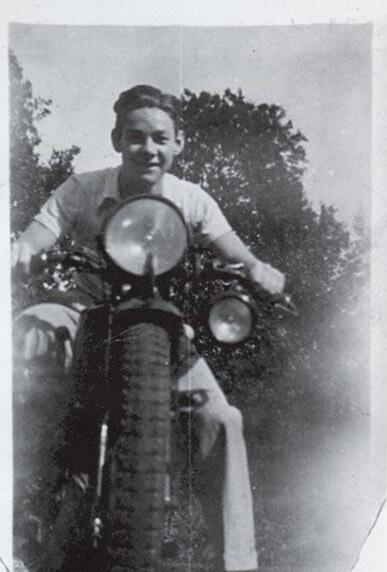
Iwould like to talk to you today about a British volunteer, who lived just down the road from here. He was one of many taken prisoner by Franco’s forces during the Spanish Civil War. Some of you will have known him; others will have known of him. His name was George Wheeler.
George’s mother was an unpaid domestic worker, his father a door-to-door salesman and a socialist. George always saw himself as an anti-fascist, though he was not political in a party sense. He was much more interested in sport, excelling at football, swimming and, in particular, boxing.
In the spring of 1938, the 24-year-old was living with his mother in Battersea and working as a wood machinist. Incensed by the British government’s support for non-intervention in Spain, which George could see was clearly working in favour of Franco’s rebels, he decided to join the fight against fascism.
Following a brief interview in London by a senior member of the Communist Party, he was accepted into the International Brigades, despite his lack of military experience. George travelled to Spain in a group that included the Liverpudlian Jack Jones, arriving on 27 May 1938.
It was not an auspicious time to join the fight, for a huge Francoist offensive launched earlier in the year had smashed through Republican
‘It is almost impossible to imagine how awful the day-today experiences must have been. ’
lines, splitting the Spanish Republic in two. As Bill Rust brutally summarised in his history of the British in Spain:
The 1938 … recruits had no illusions; they knew they had come to face death. [Bill Rust, ‘Britons in Spain’, p104.]
Nonetheless, George joined No. 4 Company of the British Battalion on 30 June. His first combat experience came the following month when the British Battalion was part of the huge Republican offensive across the River Ebro.
In the full heat of the Spanish summer, bombed and shelled remorselessly, George
fought alongside his comrades in the International Brigades and the Spanish Republican Army to try to retake the territory lost in the spring. He fought at Corbera, at Hill 481, near Gandesa and at the aptly named Hill 666.
After a brief stay in hospital due to an infection, George rejoined the battalion in September to participate in its final action on Spanish soil. As you probably know, it was
‘Even in these darkest hours, prisoners showed astonishing courage to maintain their humanity, to resist. ’
nothing short of a disaster. Only a matter of hours from being withdrawn, many volunteers were killed or wounded, while George and a number of his comrades were surrounded and taken prisoner by Franco’s troops.
As George will have been well aware, many International Brigaders taken prisoner by the Nationalists were never heard from again. So when he and the other prisoners were lined up against a wall with their hands tied behind their backs, one can only imagine what must have been going through their minds.
But to their great relief, this was not to be their fate; Mussolini’s pressure on Franco to exchange captured International Brigaders for Italians probably saved their lives. Instead, they were taken away and locked up in the nearby city of Zaragoza.
Knowing what happened during the war that followed, we should not be surprised at the terrible treatment George and the other prisoners were subjected to: that they were transported for several days, crammed into cattle trucks; that the POW camp, in a decaying monastery near Burgos, called San Pedro de Cardeña, was to all extents a concentration camp; that the conditions were overcrowded and insanitary, proving a fertile breeding ground for fleas, lice and disease; that the food was woefully inadequate.
George described it as a mixture of ‘stale bread and table scraps’, which looked like pigs’ swill; and that violence was endemic, with prisoners viciously beaten with wooden sticks for the slightest reason, or for none at all. It is almost impossible to imagine how awful the day-to-day experiences must have
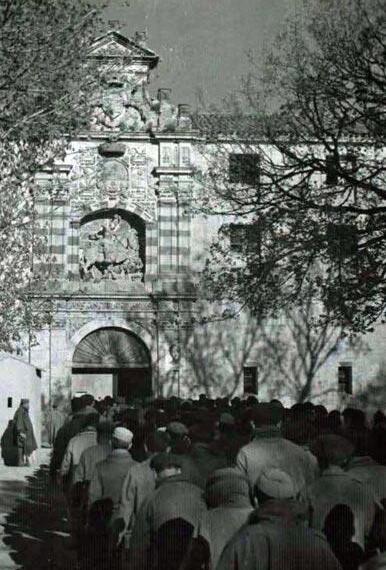
p Prisoners of war filing through the gates at San Pedro de Cardeña, where George Wheeler was held.
t A photograph of a young George taken from his memoir, ‘To Make the People Smile Again’.
been. Understandably, many must have wondered whether they would ever see their homes again.
And yet, even in these darkest hours, prisoners showed astonishing courage, finding ways to maintain their humanity, to resist: they practised sports, such as football and boxing (much to George’s delight); they played chess, with pieces carved out of old bits of soap or dried bread; they held political meetings and ran education classes; and a clandestine newspaper, The Jaily News , lampooned the camp and its authorities. Mockery is, of course,
GEORGE WHEELER
a powerful form of resistance.
When one of George’s comrades, Morrie Levitas, was ordered to read out fascist propaganda, he deliberately mispronounced words, skipped punctuation and added random pauses, reducing the prisoners to laughter and the guards to fury.
When prisoners were instructed that, when saluting, they must bellow ‘¡Fran-co!’, in two distinct syllables, George described how they subverted the order: With volume and enthusiasm we English speaking prisoners shouted ‘Fuck You!’ The guards would come in among us swishing their sticks and yelling ‘¡mas fuerte!’ – much louder. And with even greater gusto we would respond with, ‘FUCK YOU!… FUCK YOU!’ [George Wheeler, ‘To Make the People Smile Again’, p155.]
After three months in San Pedro, in early January 1939, news finally arrived that George and 76 other British prisoners were to be released. However, freedom did not immediately beckon for George, only another prison in San Sebastián. It was not until April – after the end of the civil war – that he was finally released. This response to freedom was actually written by one of George’s fellow prisoners from Nottingham, but I suspect it holds true for all of them:
That day was surely one of the greatest of my life. I simply cannot convey all of the feelings and emotions which I experienced: relief at having come safely through the dangers of war, joy at being on my way home, excitement at the prospect of seeing my family again, sorrow over the certain defeat of the Republic, anger that the Fascists had been allowed to triumph because of the timidity and dual standards of the western democracies, and deep sadness at the loss of so many friends and comrades who would never be leaving Spain but lying for the rest of time in shallow graves in her dusty soil. All of these emotions and others welled up inside me, but no regret at having committed myself to a cause which I felt to be a just one. [Walter Gregory, ‘The Shallow Grave’, p152.]
You will be pleased to know that George recovered from his experiences in San Pedro and continued his fight against fascism during the Second World War where he was posted, bizarrely, to Sierra Leone.
After being demobbed he returned to a quiet civvy life with his wife, Winnie, who he had married in 1940. George lived to a grand old age and, to his delight, his account of his time in Spain, ‘To Make the People Smile Again’, was published in 2006.
Today, we remember George and all the other open-eyed volunteers.
q Richard Baxell laying a wreath at the national memorial in London’s Jubilee Gardens in July 2024 while IBMT President Marlene Sidaway looks on.
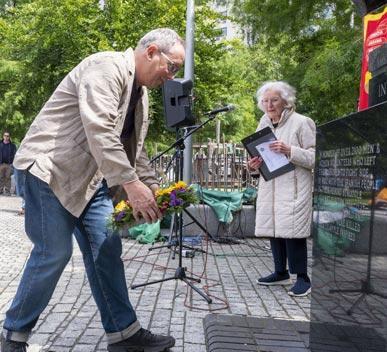
Music and art to tell their stories
Supporters and descendants of volunteers from Hull gathered in Alfred Gelder Street in November 2024 at a rededication of the Hull memorial to the local Brigaders. The event was organised by Hull Trades Union Council. Its Secretary General, Joe Gibbons, spoke at the event and music was provided by Joe Solo.
The Hull memorial was created by Dan Jones and was unveiled on 16 March 2019 in the presence of nine volunteers’ families.
Bringing solidarity home
Hull was also one of the venues for Rob MacDonald’s ‘Bring Solidarity Home’ project. In his week-long residency at Hull School of Art, Rob welcomed 250 students to a series of talks and workshops.
Rob’s 2024 autumn tour also took in Woking, Liverpool, Hartlepool, Llandeilo, Barcelona and Malgrat de Mar.
In the build-up to the 90th anniversary of the sinking of the Ciudad de Barcelona in 2027, Rob hopes to run more participation art workshops in which people can make alabaster mini-Brigaders as monuments of solidarity to take home.
The project is inspired by Rob’s work at Solidarity Park in Malgrat de Mar, near where the Ciudad de Barcelona sank, having been torpedoed by an Italian submarine. An estimated 65 onboard volunteers drowned.
Rob’s work uses historical memory, art and education to tell stories of the Spanish Civil War and the International Brigades.
u Clockwise from top:
l Supporters and family members raise their fists in solidarity with the Hull Brigaders.

l Joe Solo performing live.
l Solidarity Park’s Rob MacDonald with a group of students at Hull School of Art.
l Joe Gibbons speaking at the Hull memorial.

Andrew Wiard
All photos of the Hull rededication by Neil Terry.
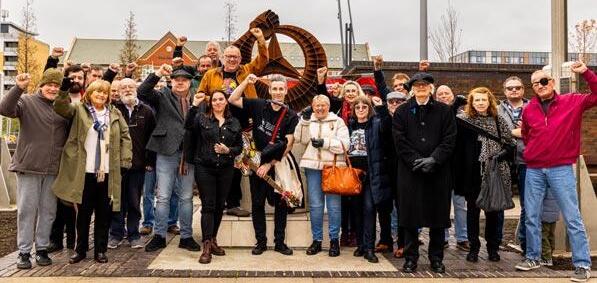

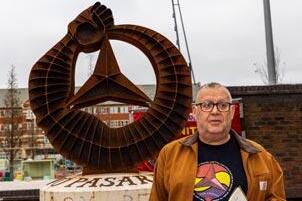
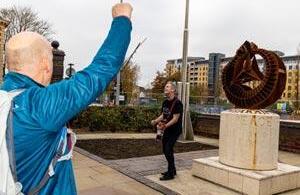
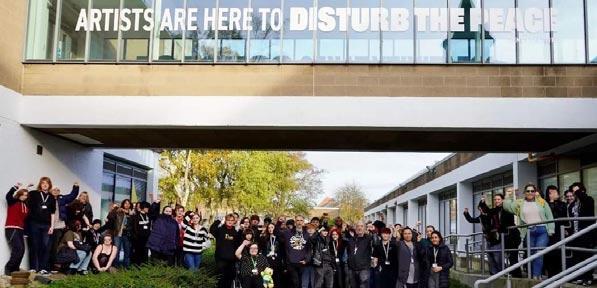
Neil Terry
A new memorial for the Brigaders
ROBERT HARGREAVES
reports on the campaign for a fitting tribute in North West England, spearheaded by IBMT member Barrie Eckford.
Proud Salford, for so long overshadowed by the adjacent city of Manchester, is fired up to reclaim its place in the history of the British Battalion and the Spanish Civil War.
At least 30 men and women from greater Salford served in the International Brigades. Ten did not return, and many were wounded.
Now, North West IBMT stalwart Barrie Eckford is determined to mark their place in
history with a new memorial that will remind future generations of the sacrifices made by brave volunteer Salfordians.
Barrie, a retired Unite the Union member, has teamed up with Salford councillor and Unite official Jack Youd to spearhead a fund-raising campaign for the memorial.
The key element in the campaign is a social media crowdfunding appeal under the auspices of Salford City Council.
Including a generous £1,000 donation from the Unite service branch, the crowdfund has already raised almost £2,000. And with Jack’s support, Salford’s Mayoral Fund has undertaken to match the donations made from other sources.
Addressing an enthusiastic meeting of Salfordians in the council chamber, as part of the city’s Histories Festival, Barrie spoke of the special contribution Salford citizens made to the defence of the beleaguered Spanish Republic in the face of Franco’s military onslaught on democracy.
Said Barrie: ‘The people of Salford were politically aware. They had borne deprivation
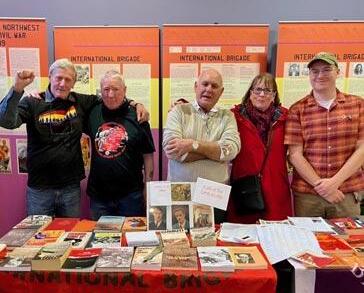
and unemployment with magnificent courage and had witnessed the threat of fascism as Mosley’s blackshirts stalked their streets.
When Franco launched his attack on the democratically elected government of Spain, these men and women told themselves: ‘we will fight!’
In turn, Cllr Youd explained his dedication to the cause of a memorial: ‘I have always been an anti-fascist. My concerns brought me into contact with the IBMT. It goes without saying that I am a passionate Salfordian, and looking back at the history of our city, I feel that the Brigaders helped to give us our unique identity.’
Jack’s wife, Charlotte, also a councillor, echoed these sentiments. ‘Yes, it’s about our history and identity, and that means our children’s future as well.’
She added that the city remembers with pride not only the Salford Brigaders but also its citizens who made huge sacrifices to
‘Looking back at the history of our city, I feel that the Brigaders helped to give us our unique identity.’
contribute to Spanish aid and food ships, as well as those who welcomed and cared for many of the Basque children evacuated from Spain at the height of the war.
Another key contributor to the project is Ben Perry, a postgraduate research student at York University whose research has retrieved wide-ranging facts about individual Brigaders.
‘The IBMT Volunteers database has been invaluable’, said Ben, who helped staff the IBMT stall at the festival.
The campaign for a Salford memorial, envisaged as an obelisk bearing the names of the city’s volunteers, in the square adjacent to the Working Class Memorial Library (WCML), has the support of the mayor, Cllr Paul Dennett, Salford Trades Union Council, numerous community groups such as the Ordsall Community and Arts Centre and the WCML itself.
To donate to the crowdfunding campaign, go to: www.crowdfunder.co.uk/p/salf ord-international-brigadememorial.
q IBMT volunteers, from left to right, Rob Hargreaves, Stuart Walsh, Barrie Eckford, Stephanie Turner and Ben Perry at the Salford Histories Festival in October 2024.
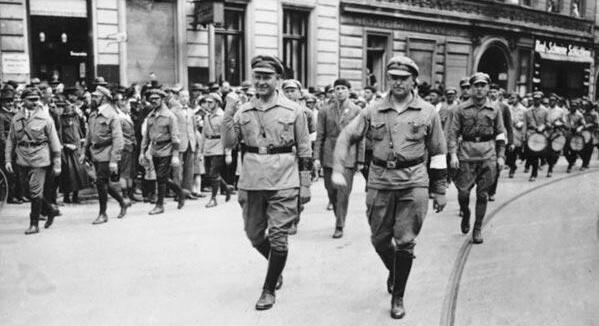
Ernst Thälmann (left), after whom the battalion was named, leading Red Front Fighters' League (RFB) in Berlin, June 1927.

Valiant and heroic were the Thälmanns
‘Spanish Sky Spreads Its Stars: The story of the Thälmann Battalion and the first Germans in armed struggle against fascism’ by Ewald P Schulz (International Brigade Commemoration Committee, Belfast, 2024).
More than 4,000 Germans fought in the International Brigades or in the anti-fascist militias and other Spanish military units during the Spanish Civil War. Over 1,000 of them gave their lives.
Their story is recounted in this booklet by Ewald P Schulz, a Berlin-based lawyer and journalist who is active in the KFSR, the IBMT’s sister organisation in Germany. The booklet’s title is taken from the song ‘The Thälmann Column’ by composer Paul Dessau and his wife Gudrun: ‘Spain’s sky spreads its stars over our trenches / And the morning already greets from afar’.
Usually known as the Thaelmann Battalion in Spain, the battalion was named after Ernst Thälmann, leader of the KPD German Communist Party. He was arrested as soon as Hitler took
power in 1933 and executed on the Führer’s personal orders in Buchenwald concentration camp in 1944.
As Schulz points out, the German volunteers differed from their British, Dutch, French and Scandinavian counterparts in that they were effectively homeless. Many were already in exile from Nazism and those who travelled to Spain from Germany could also not return home.
The same was true for the battalion’s Austrians following the Anschluss of March 1938, when Germany marched into Austria.
‘For the first time they had the opportunity to stand up to the fascists and to oppose their violence. ’
The decision to fight fascism in Spain – on occasions pitted against the airborne Condor Legion sent by Hitler to help Franco’s rebels – had a special meaning for the German volunteers.
‘For the first time they had the opportunity to stand up to the fascists and to oppose their violence,’ Schulz writes.
Between 60 and 70 per cent of the German volunteers were communists, the rest mostly social democrats, anarchists or supporters of other left organisations. ‘They were all united by the conviction that Spain should not suffer the same fate as Germany.’ Three of them are given brief biographies.
Hermann Drumm, a miner from Saarland in south-west Germany, was a member of the SPD social democrats and became a company commander before being killed, aged 38, at Belchite in September 1937.
Käthe Hempel (1911-1966) was originally from Waldheim, a town west of Dresden. In the summer of 1936 she was living in Switzerland, from where

she cycled to Barcelona to take part in the planned People’s Olympiad, which was being organised as an anti-fascist alternative to the Berlin Olympics. She was a communist and served as a nurse in Spain.
Alois Weisberger (1904-?) was another miner from Saarland and was one of the few members of the Catholic Centre Party to join the Thälmann Battalion. The party, indeed, had voted in favour of Hitler’s Enabling Act that gave the Nazi leader untrammelled powers. After the war in Spain, Weisberger was interned in France and in 1943 handed over to the Gestapo and sent to a concentration camp.
The German volunteers fought in all the great battles of the war in Spain: the defence of Madrid, Jarama, Guadalajara, Brunete, Teruel and the Ebro. Having no homes to go to after the International Brigades were stood down in September 1938, the Germans, along with the Austrians and Czechs, took up arms again in January 1939, bravely covering the flight of refugees towards the French border as Franco’s forces advanced through Catalonia.
Perhaps the most interesting part of the booklet is the account of what happened to the surviving Thälmanns after the war. Interned by the French in a network of camps, some managed to secure visas to Britain, Mexico, the Soviet Union and the US.
Others were recruited to French labour battalions. Those still in the camps following the French surrender to the Germans in 1940 were sent
‘In contrast with West Germany, however, the volunteers in Spain entered the cultural canon of the GDR. ’
to concentration camps, where many perished, or escaped to join the French Resistance.
After the defeat of Nazism in 1945, contrasting receptions awaited the veterans in West and East Germany. In the Federal Republic, they fell foul of the state’s official anti-communist ideology, which included the banning of the KPD in 1956.
While former members of the Condor Legion received pensions for their service in Spain, there was no such recognition for those who had fought fascism and Nazism in Spain.
In the GDR the International Brigade veterans were officially honoured. They served in leadership roles in the East German army as well as in the country’s police and in government positions.
Some, Schulz acknowledges, were regarded with suspicion during the Stalin era, above all any who had lived in Western countries before returning to Germany. A few lost their jobs and were unjustly persecuted, such as prominent writer Walter Janka.
In contrast with West Germany, however, the volunteers in Spain entered the cultural canon of
the GDR. ‘Countless books, songs and films were published. Streets were named after Spanish fighters. Medals were awarded and every child learned about the war in Spain at school.’
Born in 1968 in West Germany, Schulz says he only found out about the Thälmanns after 2000. Most older left-wingers in the FRG first came across their story through the songs of singer-composer Ernst Busch, two albums of which were released in the 1980s.
The songs had been recorded in Barcelona in 1938 with the help of an International Brigade choir. Some of the recordings were released in New York in 1940 under the title ‘Six Songs for Democracy’, with American actor, singer and civil rights campaigner Paul Robeson writing in the sleeve notes: ‘Valiant and heroic was the part played by the International Brigade in the glorious struggle of the Spanish Republic.’
Schulz’s text for this booklet is based on a talk he gave in 2023 as part of Belfast’s annual Féile an Phobail (People’s Festival). The event was hosted at the Shankill Library by the IBMT-affiliated International Brigade Commemoration Committee. The booklet also includes tributes to Manus O’Riordan, the son of Cork Brigader Michael O’Riordan, and Belfast-born volunteer Paddy McAllister.
JIM JUMP
CopiesofthebookletcanbeorderedfromtheIBCC for£6plus£2.50p&pwithintheUK.ContactLynda Walker of the IBCC for more details: lyndaernest@btinternet.com.
Unsung Republican heroes

A‘Churchill’s Spaniards: Continuing the Fight in the British Army 1939-46’ by Séan F Scullion (Helion & Company, 2024)
lthough the role of Spanish Republicans in the Free French forces and the French Resistance has been well documented, little attention has been paid to Republican exiles who served in the British Army during the Second World War. This gap has now been filled by Sean Scullion, a serving British Army officer brought up in Spain. Scullion has traced 1,072 volunteers whose names and ranks are listed in the appendices, along with, in some cases, dates of enlistment, places of origin and previous occupations. His research, conducted over eight years, has traced many of the men’s families, some of whom provide valuable material, including photographs.
Given the dispersal of volunteers in different units, the book abounds with names and acronyms of military units, but these, and other terms, are helpfully listed in a glossary. There is also a detailed chronology covering the period from 1914 to the death of Franco and several maps to assist readers who are not experts on the Second World War.
Recruits
Most Spanish Republican recruits can be considered escapees from two military disasters: the Republican collapse of early 1939 and the Nazi defeat of France in June 1940. The key British unit for those recruited in 1940 was No. 1 Spanish Company of the Auxiliary Military Pioneer Corps. According to Scullion, this was the only entirely Spanish unit in the British Army.
Early recruits came from two main sources: members of the French Foreign Legion who had fought in Norway in May-June 1940 and members
of No. 185 Labour Battalion who had supported British forces in France. The first group included some 300 men who mutinied at Avonmouth Docks in protest at the agreement between the British government and the Petainist Regime to return them to France.
As Scullion points out, these were ‘battlehardened men who, in some cases, had fought
‘As Scullion points out, these were battle-hardened men who, in some cases, had fought continuously for years.’
u SAS commando Rafael Ramos (foreground) helping to train partisans prior to the attack on the HQ of the 51st German Mountain Corps .
continuously for years’. No. 1 Company was based in the UK until 1944 before transferring to France and was used in constructing defences and other support tasks.
Many of its members, however, would be transferred to other units and see active service during the conflict. Over 100 would undergo training courses to enter the Special Operations Executive (SOE). Scullion has also identified a total
‘Scullion is aware that more of “Churchill’s Spaniards” remain to be discovered and he clearly regards his work as unfinished.’
of 15 Spanish members of the SAS and he traces their deployment in France and Italy in the later stages of the war.
The defeat of France also explains the recruitment of another group. Scullion lists 75 members of the Foreign Legion who crossed from Syria into Palestine to join the British in June 1940. Most became members of No. 50 Middle East Commando, which was sent to Crete, where they covered the British evacuation in May-June 1941. Among those captured were 37 Spaniards who would spend the next four years in POW camps in Germany.
Others, however, managed to escape capture, including Francisco Gerónimo, who emerges as one of the most extraordinary figures in Scullion’s account. A native of Málaga and an apprentice electrician in 1936, Gerónimo fought at the Ebro, before joining the Foreign Legion and crossing from Syria into Palestine. After avoiding capture in Crete for 11 months, he was rescued and would later join the Special Air Service (SAS).
Source
The largest single source of recruitment, however, totalling some 500 men, occurred after the Allied invasion of North Africa in November 1942. These included Spanish Republicans transferred by the Vichy regime from camps in France to North Africa as well as men who had escaped from Spain in March 1939 by sea to Algeria and Morocco, where they were held in French labour camps.

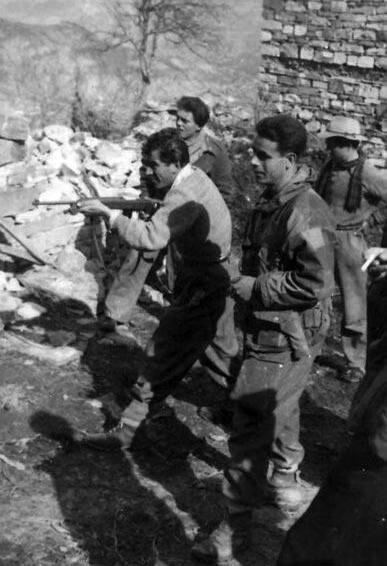
reservations of British officers, it is clear that they soon gained respect for their commitment and abilities. As veterans of the Spanish Republican army, they were, however, liable, if captured, to be sent either to German concentration camps or to their fate in Franco’s Spain. To avoid this they usually claimed to be British subjects born in Gibraltar. Some, especially members of the SAS, adopted British names.
Scullion traces the changing tide of the war and its effects on the volunteers. In 1940-41, some members of No. 1 Spanish Company were trained for infiltration into their homeland in the event of Spain entering the war on Hitler’s side or being invaded by the German army.
felt in 1945 when the Allies left Franco in power. By 1945, most could justifiably claim to have been fighting fascism for nine years. Afterwards, over 500 remained in the UK, taking British citizenship and some adopting British names.
Married
Many married British women and many settled in London, where the Spanish ex-Servicemen’s Association (founded in 1960) would be based and which would campaign against the Franco regime until the dictator’s death.
Not surprisingly, language would be a problem, even in No. 1 Spanish Company. Despite the initial
As the war progressed these dangers receded and they were redeployed, which, as Scullion indicates, was a severe blow to morale. This, of course, was a foretaste of the disappointment they
Scullion is aware that more of ‘Churchill’s Spaniards’ remain to be discovered and he clearly regards his work as unfinished. Nevertheless, his book provides deserved recognition of the contributions of some extraordinary refugees from the Spanish Civil War.
CHARLIE NURSE
Dr Grizi
Collection

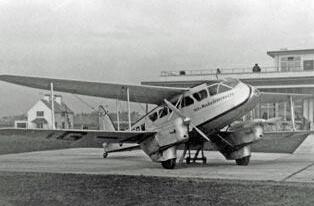
A tale of two
JIM JUMP recalls a flight that launched the Spanish Civil War – and the local men who took part in the conflict.
Croydon airport has an honourable place in the annals of the Second World War. It was from there that scores of RAF planes helped see off Hitler’s Luftwaffe in the Battle of Britain. Throughout the war, it remained an important gateway for thousands of troops being sent into action.
But the airport – closed in 1959 – hides a darker secret from the preceding years.
On 11 July 1936 a British spy, Major Hugh Pollard, took off for the Canary Islands in a chartered de Havilland Dragon Rapide along with ‘two blondes and a trustworthy fellow’ in the cockpit. He told everyone they were going on holiday.
The truth was very different. Working with plotters in Spain, Pollard’s mission was to pick up General Francisco Franco and take him to Spanish Morocco.
Franco had been exiled to the Canaries by the elected government of the Spanish Republic, who didn’t trust him – with good reason, as it turned out.
Once airlifted to Morocco, the general took command of Spain’s elite Army of Africa and launched a fascist-backed military uprising that sparked the Spanish Civil War.
Croydonians shouldn’t despair, however, over this blot on their record. During the ensuing war in Spain, many local men volunteered to fight Franco and fellow jack-booted dictators Hitler and Mussolini.
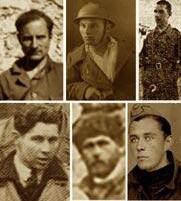
Croydons
Men like journalist Bill Harrington, from Thornton Heath. He was in Spain for nearly two years, fighting at the battles at Jarama and Brunete outside Madrid, and then in Aragón and at the Ebro, the last great battle of the war in 1938, where he was wounded.
Another casualty at the Ebro was John Peet, a teacher from south Croydon, who was injured in the ankle. He later settled in East Germany, working for the country’s propaganda ministry.
Cyril Sexton, a gardener from Selsdon, was a machine-gunner in the British Battalion. Wounded in the upper arm at Jarama in February 1937, he recovered in hospital and was sent back into action at the Ebro in the summer of 1938. There he was injured again and he carried a scar on his cheek for the rest of his life.
Croydon-born Miles Tomalin was a brilliant poet, writer and musician (he rescued the recorder from Tudor obscurity and made it a popular instrument again). He served in the British Anti-Tank Battery and was also wounded at the Ebro.
Captured in that same battle was George Wheeler, a wood-machinist from Mitcham, who later moved to Battersea. He returned home after the war ended in April 1938 (see page 14). His
‘What, we should ask, was a British intelligence officer doing getting involved in a military coup?’
tt A de Havilland Dragon Rapide of the type that carried Franco.
t Six Croydon volunteers, clockwise from top left: Miles Tomalin, Cyril Sexton, Harry Evans, John Peet, George Wheeler and Bill Harrington.
brilliant 2003 autobiography, ‘To Make the People Smile Again’ tells of his exploits in Spain.
Other volunteers lent their skills to the war effort. Electrician Harry Evans from West Wickham, for example, spent his time in Spain in workshops repairing damaged vehicles.
Nearly 20 men from Croydon and its environs served in the International Brigades. Surprisingly, given that one in five volunteers died in Spain, none of the Croydon men was killed.
Franco won the war, but the International Brigades helped Spain’s government hold out for nearly three years and in doing so played a part in shifting public opinion in Britain away from pacifism and appeasement of Nazism.
Back to Major Pollard. What, we should ask, was a British intelligence officer doing getting involved in a military coup, the outcome of which would embolden Hitler and Mussolini and hasten a world war? The answer is that we don’t know, but we can have a good guess. What we do know is that Britain shamefully pursued a policy of appeasing the fascist powers during Spain’s war.
So-called ‘non-intervention’ was supposed to look even-handed. In reality, it meant that the Spanish Republic couldn’t buy arms to defend itself.
Pollard and his pilot Cecil Bebb were personally decorated by Franco, awarding them fascist Spain’s highest military honour: the Imperial Order of the Yoke and Arrows. The list of other recipients is a rogues’ gallery of war criminals, from Hitler to Himmler and from Mussolini to Von Rippentrop.
The verdict of history will rightly be harsh on Pollard and his fellow British spooks and on the British governments of Stanley Baldwin and Neville Chamberlain for what they did in destroying Spanish democracy and appeasing fascism.
But the volunteers who went to Spain from Croydon and elsewhere to join the International Brigades have a special place in the pantheon of those who fought for justice over the years. As the cry that was coined in Spain says: ‘¡No pasarán!’
Proceeds help fund the commemorative, educational and publicity work of the International Brigade Memorial Trust.
Free postage & packing on goods totalling £30 or more for orders within the UK and Europe.
Send orders, including your name and address, a size and colour where appropriate, and a cheque payable to the IBMT to: IBMT Merchandise, 37a Clerkenwell Green, London EC1R 0DU.
For multiple orders in the UK up to a value of £30 (excluding p&p) calculate total p&p by taking the highest p&p among items ordered, halving the p&p of the remaining items and adding them together.
For orders outside the UK or to pay by credit card or PayPal, go to the merchandise page on our website: (www.internationalbrigades.org.uk/ catalog) where there are also other items listed for sale.

The IBMT shop

Spanish Civil War postcards: Collection of 20 cards based on designs originally made in 1937 by the Sindicat de Dibuixants Professionals. Produced in collaboration with art reproduction specialists Past Pixels.
£12 plus £3 p&p.

Scotland International Brigade tote bag: This tote bag remembers the 549 Scottish volunteers who fought fascism in Spain. Produced by radical merchandise specialists Red Molotov.
£11 plus £3 p&p.

Wales International Brigade tote bag: Celebrate the 184 volunteers from Wales who fought fascism in Spain with this tote bag. Produced by radical merchandise specialists Red Molotov.
£11 plus £3 p&p.

British Battalion t-shirt: Based on the original British Battalion banner brought back from Spain towards the end of the Spanish Civil War. Design comes in full colour or monochrome. Produced by merchandise specialists Red Molotov. Available in sizes: XXL, XL, L, M, S £20 plus £3 p&p.

Ireland International Brigade tote bag: This tote bag combines the Spanish Republic’s flag and the starry plough of the Irish Citizen Army. Produced by radical merchandise specialists Red Molotov.
£11 plus £3 p&p.

IBMT classic badge:
A vintage badge design in purple, red, blue and gold, with the IBMT name in a banner across the foot of the badge.
25mm x 20mm.
£5 plus £3 p&p.



Felicia Browne t-shirt: A tribute to the women who volunteered to support the cause of anti-fascism in the Spanish Civil War. Based on a sketch of a militiawoman by Felicia Browne, a British artist who was herself a militiawoman in Spain. Produced by merchandise specialists Red Molotov. Available in sizes: XXL, XL, L, M, S £20 plus £3 p&p.


International Brigades greetings cards: Featuring five different pieces of International Brigade-themed artwork. Produced in collaboration with art reproduction specialists Past Pixels. 10 cards and envelopes per pack. £10 plus £3 p&p.

International Brigades cloth badge: Iron-on cloth badge with the three-pointed star of the International Brigades in the colours of the Spanish Republic. £5 plus £3 p&p.
Tote bags: High quality cotton canvas tote bag with designs based on the British Battalion banner, the International Brigade emblem or celebrating Irish, Scottish or Welsh volunteers (see designs of the respective t-shirts). Available in a range of colours. Produced in collaboration with Red Molotov. 38 x 42cms.
£11 each plus £3 p&p.

International Brigades mug: 2,500 volunteers from Britain and Ireland joined the legendary International Brigades to fight fascism in the Spanish Civil War. This quality ceramic mug features the emblem they wore with pride. Produced by radical merchandise specialists Red Molotov for the IBMT.
£9 plus £3 p&p.

British Battalion mug: This quality ceramic mug features a design based on the original British Battalion banner brought back from Spain towards the end of the Spanish Civil War. Produced by radical merchandise specialists Red Molotov for the IBMT.
£9 plus £3 p&p.
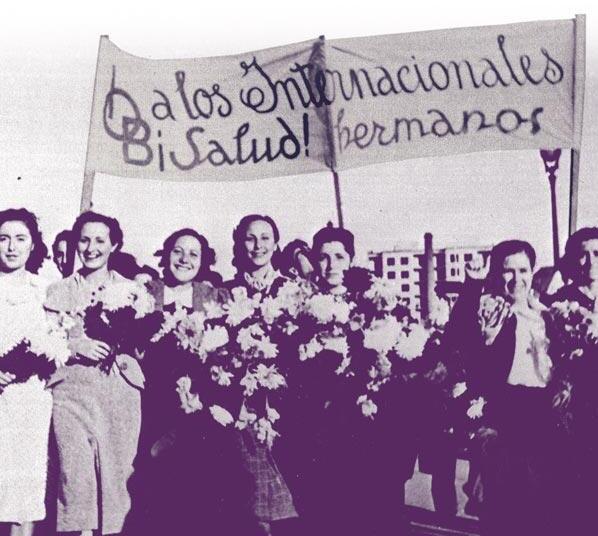
Help us inspire new generations with the story of the men and women who fought fascism and defended democracy in Spain from 1936-1939. Please consider leaving a legacy to the IBMT. To make a donation now go to: www.international-brigades.org.uk/ donation-page
International Brigade Memorial Trust
37a Clerkenwell Green, London EC1R 0DU
07865 272 639
admin@international-brigades.org.uk www.international-brigades.org.uk
